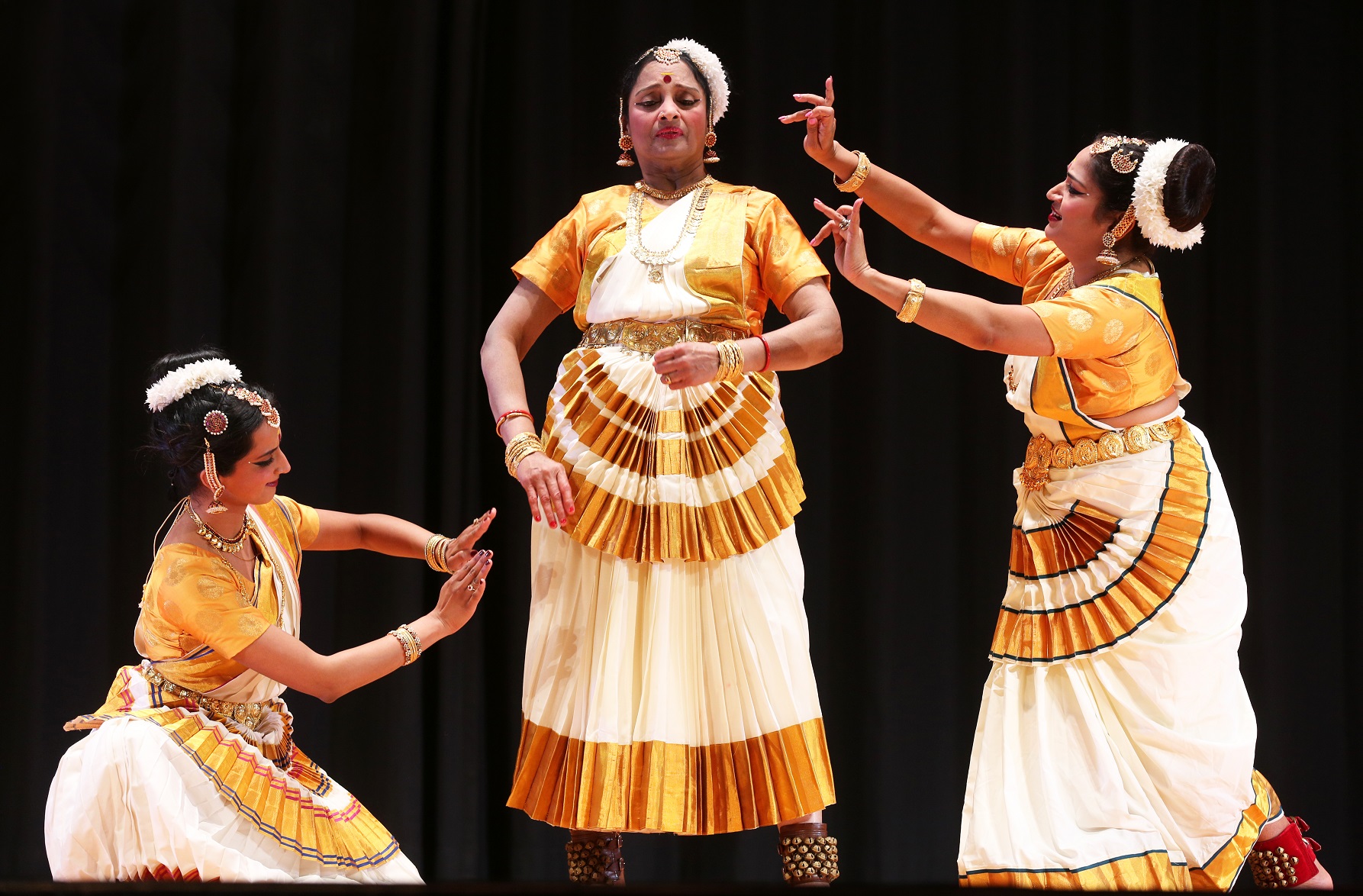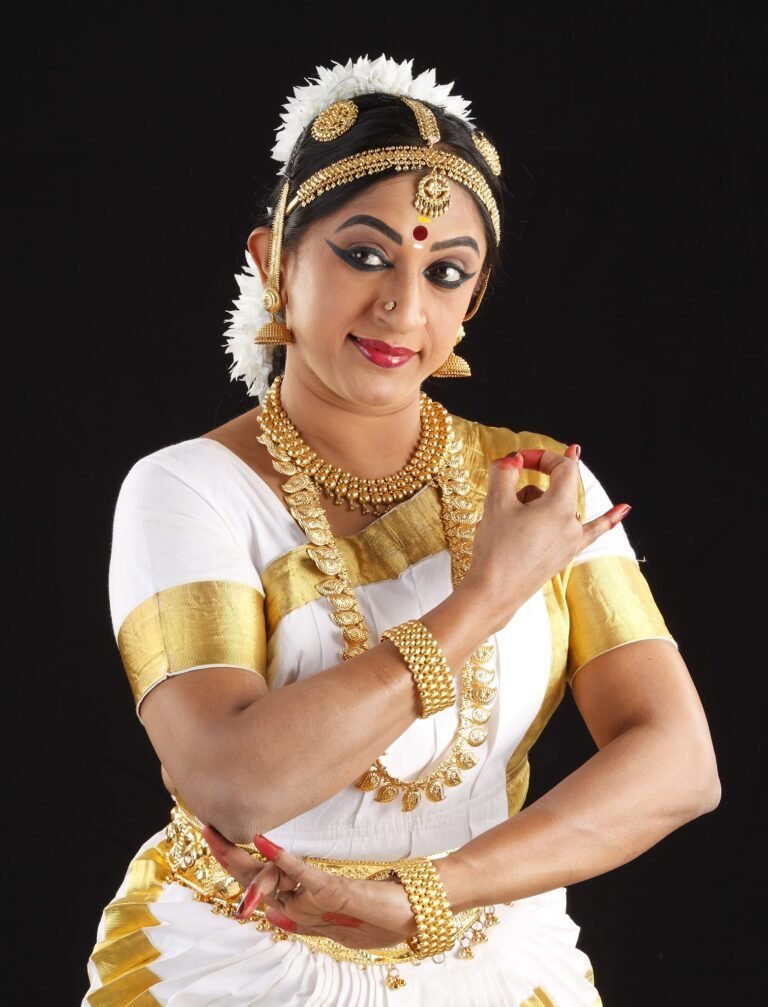
To Smitha Rajan the Indian classical dance form of Mohiniyattam is her "mother tongue" in much the same way as her native Indian language Malayalam is.
"So Mohiniyattam has allowed me to convey messages, convey stories."
That is because she grew up with it in her family. Her mother performed and taught it and her grandmother, the late Guru Kalamandalam Kallyanikutty Amma, is considered the "mother" of the dance form for saving it from near-extinction. Her grandfather did the same with the Kathakali dance form.
"I grew up with watching that, her dedication to the art form, her dedication to bringing back the art form."
By bringing back the systematic grammar and structure to the dance form, it again became considered one of the top classical dance forms of India.
"I was fortunate to learn from her by assisting her during her master classes. I used to travel with her across Kerala [their home province in India] and across India from a very young age."
Mohiniyattam is interpreted as the dance of "Mohini", the celestial enchantress of Hindu mythology and features graceful, swaying body movements and subtle facial expressions including 24 hand gestures.
"You can see the regional difference of this dance style, which is from Kerala. And the movements of this dance form, it’s like a fluid movement. It floats. It doesn’t have a sudden stop. It just flows from one thing to the other. Many a time the dance movements are compared to the paddy leaves, which float ... [and] sway in the breeze."
Dancers wear pure white or off-white with gold trims, gold jewellery and accessories. They remain in one costume, portraying different characters by their movements and expressions.
She feels as if those hand movements and expressions are her "mother tongue" as the family used to communicate using them.
"It is a medium of expression. It’s a natural thing for me and I have learned it in a natural way."
So there was never any question that Rajan would continue her family’s work. She danced on stage for the first time aged 5 and more than four decades later is still doing so. While well-versed in Kathakali, Bharatanatyam, and Kuchipudi (all forms of Indian classical dance) from her early teens, Rajan has concentrated on Mohiniyattam.
"I have always felt the significance that I have to, the importance, the responsibility which I have to carry to the next generation and keep it going."
While she knew her dancing would take her all over the world, she did not expect to move to the United States 25 years ago when her husband had a new job and remain there for so long.
"So initially, when I came here [the US], it was very difficult for me to even accept the fact that I’m going to live here away from my land, being away from whatever I practise, the dances, the music, the students. It was very big.
"But then I slowly started teaching here and started having students here. So after that, I never looked back. I never thought that I’m missing my land."

"One of the powerful points of Mohiniyattam is the abhinaya, the facial expressions and the storytelling aspect of the dance form. So wherever I go, I’ve seen how people enjoy it. And I’m so happy to say I have a very good number of fans here in [the] USA who enjoys Mohiniyattam, because Mohiniyattam is one of the later classical additions into the Indian classical dance forms. So there are comparatively very few dancers than Bharatanatyam or Odissi or any such styles."
It is a dance form that anyone who has learnt a language can learn from a young age, she says. It can include dance and acting in combination or just dance.
"As in any other language, if a student is passionate enough, she needs to dedicate some time to understand the language, to understand the basics, and then to start communicating or conversing in the particular language. So same way Mohiniyattam is also another language, which a dedicated student or an enthusiastic student can do.
Rajan has no daughter to teach but she has been teaching the dance form since she was 12 years old and there are many dancers out there to continue to spread the word.
"They have gone away and they are practising the dance style."
But she has never forgotten the efforts of her grandmother and produced a film Mother of Mohiniyattam tracing her grandmother’s story in 2019 which will be shown in Dunedin.
"My grandmother is the one person who is the reason for this dance form to be alive now. And there are, of course, there are other contributors who came later. It’s a special legacy."
It is part of her mission to preserve the traditional form of the dance her mother and grandmother taught her.
"As a teacher also, something that I have always felt is I am a big part of bringing up or transferring the knowledge from the gurus [masters] to the next generation, carrying over the stories or the history."
MāyāDharā International Indian Dance School director Emilie Reveret, International Dance Council (Unesco) member and artistic director of the French Federation of Dance in Europe, says she is "truly delighted" to be bringing the "heiress of Mohiniyattam" to Dunedin.
Newly Dunedin-based Reveret is looking to establish a branch of of MāyāDharā in the city.
"It is a privilege to host my teacher and for my international connections to be able to enrich the dance community here."
Due to the Covid pandemic she has not seen Rajan for years and is also looking forward to sharing with her a draft of a book she has written on spirituality and dance as well as introducing her work to the Dunedin community. Dance Ōtepoti founder and general manager Anna Noonan says it is incredible to be hosting an artist of this calibre and to help facilitate such high-quality dance experiences.
"Indian dance plays a rich and vibrant part of Ōtepoti’s cultural fabric — it’s amazing to have both Smitha and Emilie here sharing their wisdom and expertise for the benefit of the community."
To see
Smitha Rajan: October 12, Kid’s Indian Classical Dance Workshop 2.30pm, Mohiniyattam Classical Indian Dance Workshop, 4pm; October 13, Film Screening of Mother of Mohiniyattam, Metro Cinema, 3pm, October 19; Performance Mohiniyattam starring Smitha Rajan, 7.30pm, Trinity Catholic College Auditorium; October 20, Bharatanatyam Classical Indian Dance Workshop 10am, Mohiniyattam Classical Indian Dance Workshop, 1pm.














